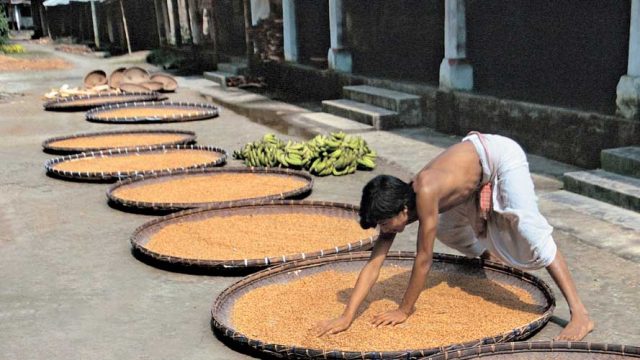The journey from the mainland to the island of Majuli can be safely counted as one of the most exciting things to do on your trip to Assam. Crossing the Brahmaputra usually requires a lot of planning. The seemingly peaceful river, which resembles a sea by virtue of its expanse, is turbulent beneath the surface and is highly unpredictable. But that does not deter ferries or boats from plying to and from the island to the towns of Jorhat, Lakhimpur and Dibrugarh. These ferries are a wondrous sight by themselves as bikes and cars of all sizes are loaded onto them. They also carry people, cattle, gunny sacks and basically anything that cannot swim across a river. Grab a seat and observe the characters around you.
As the ferry cruises forward, the only thing visible for miles on end in every direction is water. But when the vessel passes by a patch of land, you are destined to encounter breathtaking views. Keep your camera handy, for the perfect moment might come like a whiff of breeze.

THINGS TO SEE AND DO
The simplicity and hospitality of Majuli cannot be overlooked. Capturing the essence of the Assamese culture perfectly, the lifestyle of the island is extremely modest and simplistic. The major attractions here are the monasterylike satras. Only 31 out of the 65 original satras are still in existence. Less than ten still bask in its former glory, out of which two are covered in this guide.
Kamalabari Satra
The original Kamalabari satra was established by Bodula Ata, Madhavdeva’s favourite disciple. With time the original satra was divided in two, Uttar Kamalabari and Natun Kamalabari satras.
The Uttar Kamalabari satra is known for its Ankia Naat drama and Saali Nitya (a form of dance). The satra with its blue pillars and black ceiling is very imposing and solemn. This self-sufficient monastery has quarters for its bhakatas along with a fishing pond, paddy fields and a museum. The main hall of the satra is dark and gives the impression of a cave. For all its magnificence, the one thing that is the most evident is the peace and silence of the place.
Relatively more modest than the Uttar Kamalabari satra, Natun Kamalabari satra is known for the 215 original works of Srimanta Sankdardeva that are preserved here. There are many other historical artefacts as well, along with a great number of ancient scriptures.

Samaguri (12 km from Kamalabari)
Deviating a little from the other satras, Samaguri is popular for the practice of the art of mask-making. This practice was founded during the inception of Samaguri and has been carried over generations. The masks are made of cane, cloth, mud and dung and are mostly used during the time of raasleela. The expert artisan Hemchandra Goswami, organizes workshops on mask-making, which attracts enthusiasts from all over the world. He also takes in 15 disciples at a time to keep this wonderful tradition alive. This satra must not be missed, as an exceptional collection of masks fill its rooms. Also, if there are masks available, you could request and buy a few.
The Villages
You could always hire a taxi to move around the island, but you would be missing a lot if you do not take a walk through the small villages on the island. Most of the villagers practice weaving, farming and fishing. Boat-making, pottery and handloom are other common activities. Muga silk, which is only found in Assam, is used generously in the clothes made here. Most houses in the villages are surrounded by a small water body and require a small dinghy to carry people to and from the houses to the main road. A stray boat, awaiting its passenger is a very common sight on the side of the road. Also much to the delight of birdwatchers, many rare and endangered avian species can be found around here like the adjutant stork, pelican and the whistling teal.
WHERE TO STAY AND EAT
In Majuli, a stay at a satra offers an unusual experience. Try the Uttar Kamalabari Satra Guest House (Cell: 09707091866, 09435823352; Tariff: ₹100-500) or the Nautun Uttarkamalabari Satra Guest House (Cell: 09435208487; Tariff: ₹100-750). There is also Assam Tourism’s Prashanti Eco-Tourist Lodge (Cell: 09508098339; Tariff: ₹1,000-1,650) in Kamalabari with 11 rooms. There is La Maison de Ananda (Cell: 09957186356, 09401625744; Tariff: ₹800-1,200) as well. They arrange meals on request.
A few small restaurants in Kamalabari, Garhmur, Jengraimukh and Bongaon offer filling meals.
When to go November is the best time as it is the time of raasleela. Monsoons are best avoided as the Brahmaputra gets unpredictable Location Situated in the Brahmaputra river to the northern part of Assam Air Nearest airport: Jorhat Rail Nearest rail: Mariani
THE INFORMATION |
Tourist/ Wildlife Offices ASSAM Directorate of Tourism Assam Tourism Station Road, Guwahati Tel: 0361-2547102, 2544475 W assamtourism.gov.in |
Tourist Information Office B-1, Baba Kharak Singh Marg New Delhi Tel: 011-23345894 Nameri National Park |
Range Officer Potasali Village, Nameri NP District Sonitpur Cell: 08474067329 |
Tourist Information Office Tezpur Tel: 03712-221016, Cell: 09854334080 STD code 03712 Majuli |
Tourist Information Office MG Road, Jorhat Tel: 0376-2321579 |
SDO (Civil Admin) Garhmur, Majuli Tel: 03775-274424 STD code 03775 MEGHALAYA |
Directorate of Tourism 3rd Secretariate, Nokrek Building Lower Lachumere, Shillong Tel: 0364-2226054, 2502166 Cell: 09863021744 W megtourism.gov.in |




